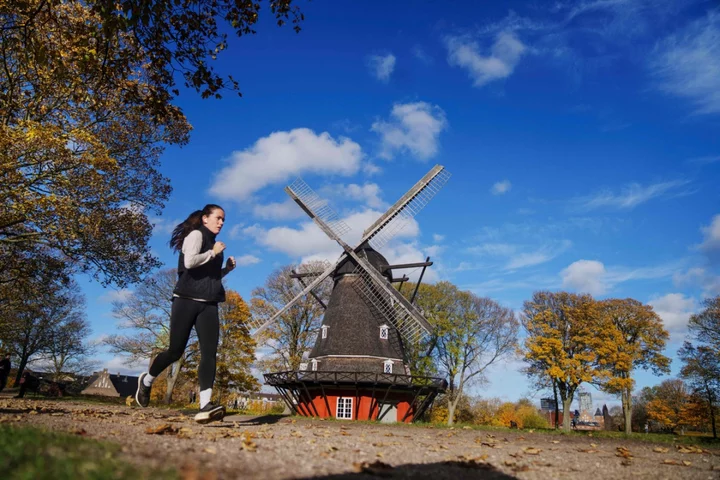
UK study finds this lifestyle change can add whole decade to life
Shifting to a healthier diet – and sticking to it – can add almost a decade to life for middle-aged people, a new study finds. The research published earlier this week in the journal Nature Food, assessed the health data of nearly half a million British residents whose eating habits have been documented as part of the UK biobank study. Researchers grouped 467,354 participants based on their eating habits and observed how these changed over time. Participants were grouped as either average and unhealthy eaters, or as people with food intake matching the UK’s Eatwell Guide and those whose diet matched what the researchers called the “longevity diet”. Currently, the UK population has a life expectancy at birth of about 84 years for women and 80 years for men. Adjusting for other contributing factors like smoking, alcohol, and physical activity, the study found that 40-year-old men and women who changed from an unhealthy diet to eating healthier food, and adhered to it, gained almost 9 to 10 years in life expectancy. “Here, using a prospective population-based cohort data from the UK Biobank, we show that sustained dietary change from unhealthy dietary patterns to the Eatwell Guide dietary recommendations is associated with 8.9 and 8.6 years gain in life expectancy for 40-year-old males and females, respectively,” scientists, including those from the University of Bergen in Norway, wrote. “In the same population, sustained dietary change from unhealthy to longevity-associated dietary patterns is associated with 10.8 and 10.4 years gain in life expectancy in males and females, respectively,” they added. Researchers say the longest gains in life expectancy were made by those changing their diets to consume more whole grains, nuts and fruits and less sugar-sweetened beverages and processed meats. Those who initially followed an average diet and later changed to healthier eating habits were found to have smaller life expectancy gains. “The bigger the changes made towards healthier dietary patterns, the larger the expected gains in life expectancy are,” researchers explained. The life expectancy gains also seemed to be lower when the diet change was initiated at older ages, but even these are substantial, scientists say. For instance, they say, even 70-year-olds can manage to extend their life expectancy by 4 or 5 years if they make a sustained diet change. The latest findings point to government actions that could contribute to people’s health improvements in the UK, such as health-oriented food taxes, improving food environments in school and working places, as well as subsidies to reduce the cost of healthy foods. “Such policy measures, informed by the up-to-date estimates on potential gains in life expectancy that we provide in this paper, could guide the deployment of resources to improve healthy eating patterns across the population,” researchers added. Read More Smoking causes 150 cancer cases every single day in UK, study finds Binman shoots first Hollywood film after chat with Mark Wahlberg changed his life ‘I could have gone blind if I hadn’t been able to go private’ ‘I could have gone blind if I hadn’t been able to go private’ Paul Rudd says ‘horrible’ Marvel diet left him drinking sparkling water as ‘reward’ How to celebrate Thanksgiving when you’re not close to your family
1970-01-01 08:00
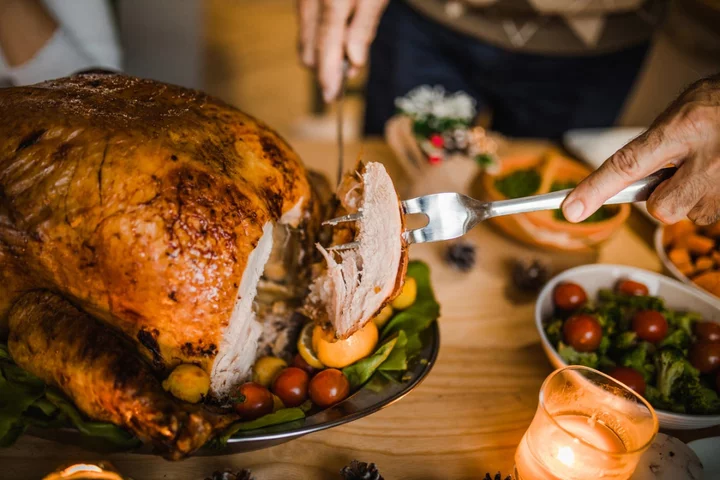
How to celebrate Thanksgiving when you’re not close to your family
Thanksgiving is only a day away and most Americans have solidified their family plans for the holiday. Whether you’re hosting the big meal or heading to a relative’s house, the holidays are often a chance to reconnect with loved ones. However, Thanksgiving Day isn’t always a family-oriented occasion. Over the years, several studies have found that the seemingly joyous holiday season isn’t always easy for everyone. In a survey conducted by the AARP Foundation in 2017, 31 per cent of respondents said they felt lonely during the holidays throughout the last five years. Meanwhile, 41 per cent of participants were concerned about a family member or friend feeling lonely around the holidays. In 2020, a survey conducted by ValuePenguin also found that 70 per cent of respondents struggled with different types of loneliness before Thanksgiving and Christmas, partly due to the effects of the Covid-19 pandemic. While socially-distanced holiday parties have mostly become a thing of the past since then, there’s still many reasons why some people spend the season by themselves. Some Americans have family members living on the opposite side of the country, or world, while others may not have a close relationship with their relatives at all. There’s no one concrete way to spend the holidays, and everyone has their own reasons why they choose not to see certain people on Thanksgiving. Speaking to The Independent, Emma Mahony, a therapist at Better Life Therapy based in Pennsylvania, acknowledged that, when we spend the holidays alone, our feelings of loneliness can be heightened. While everyone experiences loneliness in a different way, Mahony believes that the feeling could be tied to how Thanksgiving has been portrayed over the years. “I think a lot of the anxieties and concerns that come up have to do with unmet expectations of what you think a holiday is supposed to look like, and what you think your relationship with your family or your friends is supposed to look like,” she said. “I think that’s where a lot of people themselves feel a little bit of a stressful state. Just maybe feeling a little let down by the expectations they have for themselves, after watching other people experience the holidays differently than them.” The holidays are often referred to as the most wonderful time of the year, but that doesn’t ring true for everyone. In some cases, the winter months can be quite a triggering time, and potentially a reminder to people of how they’ve been hurt by those closest to them. According to Mahony, the best way to manage those feelings of animosity is by creating your own perspective about the holidays and new ways to celebrate. “I think you should allow yourself to reframe it as: ‘Okay, how do I want the holidays to look for me? Who are the people that I do want in my life? Who are the people that I don’t want in my life?’” she advised. “Don’t try to make something that shouldn’t happen happen. Instead, recreate your own memories and your own traditions, and give yourself space and permission to do so. But also, if you know that it’s going to be a hard time for you, create that support system, from reaching out to a therapist or to a close friend.” For those who do have a close support system, it can make skipping out on Thanksgiving dinner a little easier. On the other hand, your cousins may miss sitting next to you at the dinner table. Still, Mahony believes we shouldn’t try to convince our family members to attend an event in which they’ve already opted out. “If someone decides they don’t want to be with you over the holidays, respect that choice for them,” she explained. “Don’t make them feel bad for prioritising themselves and their needs. [It] will potentially, you know, make things worse long term. I just honour that everyone needs to do what’s best for them, whether that be financially, emotionally, or physically.” Even if you decide to celebrate Thanksgiving this year without your family, it doesn’t mean that you’re entirely on your own. Mahony suggested setting up a Zoom call or FaceTime with some friends, or planning a fun meal if you’re worried about eating solo. “You could really do whatever you want, so I would set up things for yourself to look forward to,” she said. For those who are spending the holiday alone, but still want to take part in Thanksgiving-related activities, spend the morning or afternoon at a local homeless centre. You can continue the day by hosting a Friendsgiving dinner or movie night with your pals who are still in town. When it comes to food, you can cook a mini turkey for one or ditch Thanksgiving dinner altogether and order take-out at a local restaurant. Then, close out the night with some early Black Friday shopping online or in person. Although this Thursday is indeed a federal holiday, who says the day can’t feel like any other? Ultimately, how you spend Thanksgiving is entirely up to you and there’s no right or wrong way to celebrate the holidays. Remember that you shouldn’t be too hard on yourself for avoiding family during the holiday season. “If Thanksgiving looks different for you year after year, that’s okay. There’s not a specific way to spend the holidays and no family looks the same,” Mahoney said. “If you’re coming to terms with the fact that being with your family for the holidays isn’t what’s best for you, give yourself a little bit of compassion there. “It will get easier over the years, as you figure out how to take care of yourself better.” Read More Viral Thanksgiving guest mix-up continues tradition for eighth year How to watch Macy’s Thanksgiving Day Parade 2023 I made an air fryer Thanksgiving dinner so you don’t have to When do stores open and close on Thanksgiving and Black Friday this year? Why do Americans celebrate Thanksgiving? How to transport everything from turkey to cranberry sauce for Thanksgiving
1970-01-01 08:00
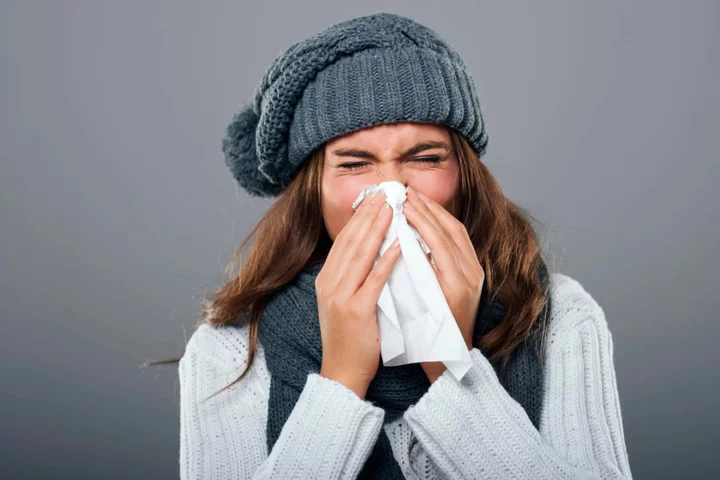
Fed up with catching colds? Here’s what your doctor really wants you to know
Already feel like you’ve had your fill of sore throats, coughs and stuffy heads this winter? Colds may be common and minor – but they can still leave you feeling rotten, not to mention being a major inconvenience. They aren’t really something you want to be traipsing to the GP surgery with either – but wouldn’t it be helpful to know what your doctor really thinks about managing winter ailments? We asked them… Getting ill is not always terrible Nobody enjoys having a cold, of course. But GP and TV medic Dr Hilary Jones – known for regular appearances on Good Morning Britain – says we can’t always “prevent exposure to viruses, especially in winter when people flock together for warmth indoors”. And if symptoms are mild, we probably don’t need to worry too much. “Let your own immune system deal with it,” says Jones. “That’s what your immune system is for – and looking on the positive side, the more you tickle up your immune system, the healthier it is. In a way, you’re stimulating your immune system to be healthy.” Antibiotics can be harmful if you don’t actually need them If symptoms are proving tougher to tolerate, it can be tempting to try antibiotics. But while there are certainly times when antibiotics are vital, they only work for bacterial infections, so taking them when you have a viral infection (such as a cold) is not only futile, but could cause harm. “Often, both clinicians and patients will be tempted to try antibiotics, even when there is little-to-no chance of them helping – ‘just in case’ and often accompanied with the reasoning of ‘what harm can it do?’,” says Dr Tom Jenkins, GP and developer of Centoreze Pelargonium. “We are now beginning to appreciate that there is potential harm at an individual level,” Jenkins adds. “There are more bacterial cells in the human body than human cells, and most of those bacterial cells are helpful and essential for healthy functioning. Because antibiotics are not selective and do not single out just bad bacteria, taking them upsets our bacterial microbiome, and we are now starting to learn about the subtle and sometimes lasting consequences of this.” Another major concern is bacteria becoming resistant to antibiotics – which the World Health Organisation (WHO) describes as one of the biggest threats to global health today. Tackling this is complex, but on an individual level, WHO guidelines suggest people only use antibiotics when suitable. Soothing home remedies are worth it Jones, who is working with Manuka Doctor, also points out: “If you do get sick, comforting symptomatic relief is really important, starting with the simple things. I’m an advocate of manuka honey – the genuine manuka honey from New Zealand, which carries a number for the antibacterial activity, the MGO methylglyoxal.” As well as its antibacterial properties, Jones says it’s “soothing for throats” and can provide an “energy boost” – plus his 97-year-old mother is a fan. “Not only does she put it in her porridge, she put it on her skin for a few lesions that she has – perfectly well-endorsed by the district nurse who comes to visit her as well. “You can also put honey in a grog, in hot water, with a bit of lemon, a bit of cinnamon – that’s something our grandmothers used to use, and to good effect.” The herbal remedy that’s doctor-approved There are so many natural remedies out there promising to fight off symptoms, and deciding between them can be overwhelming. But did you know there’s one herbal remedy that is recommended by the National Institute of Clinical Excellence (NICE) for managing certain upper respiratory tract symptoms? Pelargonium, licenced as a Traditional Herbal Remedy, is recommended by GPs to consider as one of four self-care treatment options for adults and children aged 12 and above. It’s mentioned on the NHS website’s page for coughs, too – along with getting plenty of rest, staying hydrated, Paracetamol and Ibuprofen where suitable for pain relief, and honey and lemon. Derived from plants found in South Africa and Lesotho, Pelargonium was widely used to help treat infections before antibiotics boomed. But “over the last quarter of a century”, Jenkins says , “clinical research has begun to revisit this forgotten treatment, especially in Germany, and now more recently here in the UK too.” This has “resulted in the publication of over 70 peer reviewed pre-clinical and clinical studies supporting its effect”, says Jenkins. He explains it contains “a large number of biological molecules” that work in a number of ways to “stimulate the body’s immune system to fight infections”. Diet and lifestyle do play a part “Diet is always important,” says Jones. “A healthy lifestyle does protect us and helps our immune system. Clearly there are obvious things not to do – smoking and excess alcohol – as well as poor nutrition. “We know vitamin D is important for good immune health, and there are many people who are deficient in vitamin D, who should be taking a supplement as recommended by the WHO and NHS, particularly through winter,” Jones adds (when there isn’t enough sunlight in this part of the world for our bodies to make sufficient amounts). “So vitamin D, adequate vitamin C, zinc, and sometimes things like garlic and echinacea can be helpful in making sure your immune system is healthy.” While a balanced diet comes first, Jones believes “it’s always worth considering a multivitamin, which gives you a little bit of everything, particularly if your diet is restricted or selective in any way or if you’ve got extra needs”, he adds. “But healthy eating, plenty of fruit and vegetables, adequate protein, exercising moderately and avoiding pollutants and cigarettes – those are the main things.” Check in with your doctor if you’re constantly rundown Still feel like nothing seems to help? Then it may be time to check in with your doctor. “If you’re concerned that you have any possible underlying medical problem, I would always advise discussing matters with your GP,” says Jenkins.“Sometimes recurrent infections can be a sign of an underlying infection, but sometimes they can be because you are rundown. Your GP is ideally placed here because they have your medical record, are able to look into things in more detail, and can follow you up.”
1970-01-01 08:00
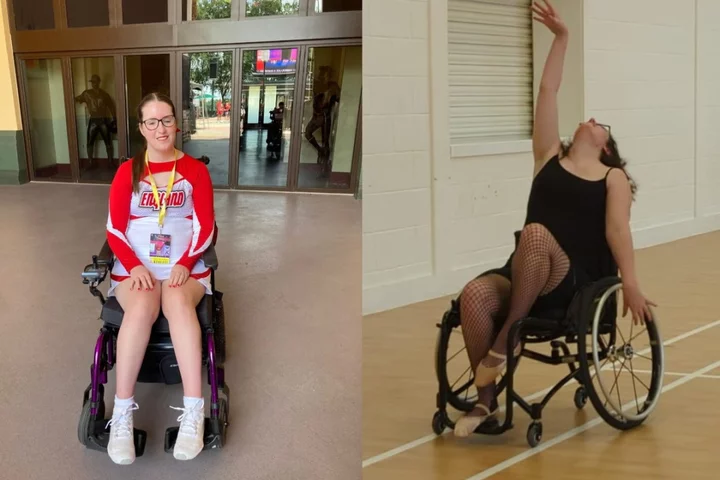
Woman told exhaustion was just ‘A-level stress’ overcomes debilitating diagnosis
An 18-year-old was told her constant exhaustion was likely caused by depression and the stress of her A-levels – only to eventually be diagnosed with a debilitating chronic illness. Elizabeth Hope, from Cheltenham, Gloucestershire, experienced painful headaches and had begun falling asleep at 5pm every day while studying for her A-levels. “My mum would wake me for dinner and then I’d maybe do like an hour’s homework, which is absolutely not enough when you’re studying for your A-levels, and then fall asleep again,” the now-27-year-old recalls. When Hope said she needed to lie down during rehearsals for the school show and stopped going to cheerleading practice because she was too tired, her parents knew there was a serious problem. “To start off with, my parents thought ‘oh she just doesn’t want to go to school’,” she says. “But I started not being able to do the things that I enjoyed, so then we realised that something was very wrong.” She visited another doctor, who found Hope was experiencing myalgic encephalomyelitis, also known as chronic fatigue syndrome or ME, a long-term illness that affects the nervous and immune systems. People with ME can experience severe pain and fatigue, as well as a range of other symptoms, making everyday physical and mental tasks exhausting, according to the NHS. Hope was so exhausted that she struggled to leave the house without using a wheelchair. “I was literally stuck in my house,” she says. “We would maybe go out to one shop and then I would have to come home. Being able to use a wheelchair was amazing for me because I could go to two or three shops or go to the park and stuff like that.” A woman of 18 told by doctors that her constant exhaustion was likely depression and A-level exam stress, was diagnosed with a debilitating chronic illness which means she uses a wheelchair, but has overcome her adversity to become an award-winning wheelchair dancer and dancing instructor. “Struggling with loneliness,” she was “really unsure” when her mother suggested she attend a wheelchair dance class in Birmingham – but it turned out to be one of the best decisions she ever made. She learnt to manage her energy levels and “fell in love with dance”, and has since gone on to perform in her wheelchair at the 2022 Commonwealth Games opening ceremony and two cheerleading world championships. “I think for people with disabilities, it’s not like you can do whatever you want, because it’s not true, but you can do things in a different way,” she says. “But I love dancing and being able to share my passion with other people is just, yes, it’s really cool”. As a dancer, Hope was soon competing and joined another two dance groups, Sun Rae Inclusive Dance and Apt Dance Theatre. She went on to win the UK ParaDance National Championships with the group and came second in the solo contest after performing to Kylie Minogue’s 2018 song “Dancing”. She also found a cheerleading group and travelled to Florida in the US, where she went on to win the world championships in 2019, in the adaptive abilities category. In early 2022, Hope received a message from a friend suggesting that she apply for an assistant dance artist job with the national disability charity Sense. “They said you can apply with a cover letter and CV or via video,” she said. “So I basically made this video about how much I love dance.” To her surprise she was invited to attend a recruitment workshop. “I was like, that was fun, but I won’t get a job because all these people are way more qualified than me,” she said. “But then I got offered the job.” Hope was initially going to turn down the job because the working hours were more than she thought she could manage, but was told they would come up with a solution. She now teaches people with disabilities to dance, from non-verbal school groups to elderly people in care homes – including a 102-year-old. “It’s just about managing my energy and pain,” she says. “So for example, I rest a lot and only work one day a week. It’s just about pacing your activity more than anything else.” For more information on the accessible arts activities Sense offers, visit: sense.org.uk/our-services/arts-sports-activities-for-disabled-people/art-for-disabled-people/ Read More A$AP Rocky claims having a family with Rihanna is his ‘best’ collaboration Ashlyn Harris breaks silence on cheating rumours following Ali Krieger divorce I present my children on Instagram like a fairytale – I’m now rethinking A$AP Rocky claims having a family with Rihanna is his ‘best’ collaboration Ashlyn Harris breaks silence on cheating rumours following Ali Krieger divorce I present my children on Instagram like a fairytale – I’m now rethinking
1970-01-01 08:00

A$AP Rocky says ‘making children’ with Rihanna is his ‘best’ collaboration
ASAP Rocky has gushed over his family with Rihanna, calling it the “best” collaboration of his career. On Friday 17 November, the 35-year-old rapper sat down with Complex during the launch of Puma’s new partnership with Formula One, in which A$AP Rocky served as creative director for the collection. When asked whether he and Rihanna will collaborate for a future Puma fashion collection, the “Praise The Lord” rapper pointed out that the proud parents have already done the most important collaboration ever. “If me and my lady was to collab what could we team up and just f***ing just smash and go crazy on?” he asked. “I think we do a real great job at collaborating and making children. I think that’s our best creation so far.” “Nothing is better than that out there, any design,” the “Sundress” singer continued. However, Rocky also gave a shout-out to “a ghost designer named God” who he said “shaped everything” for their family of four. “I mean we had a third designer come and help, a ghost designer named God, you know, and shaped everything and we had these beautiful angels. So that’s the best collaboration,” he said. While the couple have only collaborated on one song together, 2011’s “Cockiness (Love It) Remix”, Rihanna was featured in the music video for Rocky’s “DMB” in May 2022. His latest comments come as the couple - who have been dating since late 2020 - were in Las Vegas, Nevada, for the arrival of the F1 Las Vegas Grand Prix. In addition to Rihanna and Rocky, fellow star-studded attendees included Brad Pitt, Kylie Minogue, Paris Hilton, and David Beckham. Rocky, real name Rakim Mayers, was announced as creative director of Puma’s new partnership with F1 in October. The “F**kin’ Problems” rapper and the Fenty Beauty founder attended a pop-up event for the fashion collection on Friday in Las Vegas, where Rihanna wore a long leather coat, black pumps, and silver accessories. Meanwhile, Rocky was dressed in pieces from the collaboration, including neon-green Puma gloves and matching sneakers. The A-list couple secretly welcomed their second child together in August this year. According to TMZ, Rihanna gave birth to another baby boy on 3 August in Los Angeles. It was later revealed that they named their newborn son Riot Rose Mayers. Rihanna and Rocky previously welcomed their first son, RZA Athelston Mayers - named in tribute to Wu-Tang Clan leader RZA - in May 2022. This isn’t the first time the “No Limit” rapper has gushed over his family. Two months before she welcomed baby Riot Rose, Rocky referred to Rihanna as his “wife” during a concert in Cannes, France. While performing at the Spotify Beach concert for the 2023 Cannes Lions Festival, he took a moment to dedicate a song to his partner of three years. “I’d like to dedicate this song to my beautiful wife in the motherf***ing building! I love her!” Rocky said, before performing his 2022 track “DMB”. Meanwhile, a then-pregnant Rihanna watched him perform while dressed in a sheer, vintage Jean Paul Gaultier dress over a sequined bikini. Back in February, Rihanna confirmed she was pregnant for the second time during her Super Bowl halftime show performance. Read More Ashlyn Harris breaks silence on cheating rumours following Ali Krieger divorce I present my children on Instagram like a fairytale – I’m now rethinking Will an adaptogen a day keep the doctor away this winter?
1970-01-01 08:00
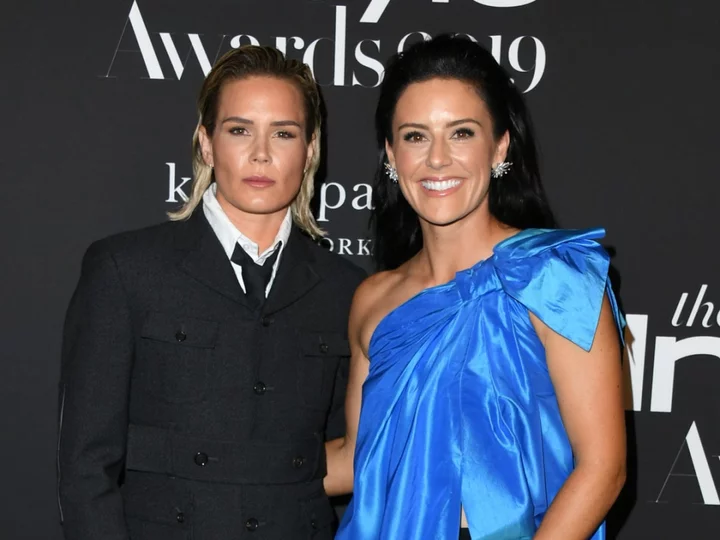
Ashlyn Harris breaks silence on ‘brutal’ cheating rumours following divorce from Ali Krieger
Ashlyn Harris has addressed rumours she cheated on ex-wife Ali Krieger amid her new rumoured romance with Sophia Bush. The former US National Women’s Soccer Team player took to her Instagram on 18 November to share a lengthy statement following her divorce from Krieger. In her post, Harris denied cheating rumours and revealed how the subsequent “online hate” has negatively impacted her mental health. “Several weeks ago, a process that had been ongoing privately for some time became public,” Harris began. “Ending a relationship after almost 13 years of friendship, teammate-ship, marriage and co-parenting (many of them good years) is a decision that was not made lightly.” “We agreed to centre our children, continue therapy, separate, and to move forward with our lives. Two happy families are always better than one unhappy one. This process is never easy, but we were making our way through,” she continued. Harris explained that the former couple were advised by their agents and representation to keep news of their split private until after Krieger finished her NWSL season earlier this month. However, the 38-year-old athlete revealed that “a leak (a betrayal of our deepest confidence) made that impossible”. “The online hate that has happened since has been one of the most personally devastating experiences of my life,” Harris said. While she noted that she was encouraged “not to feed the beast” of negative online comments, Harris maintained that the past few weeks have “devastated my mental health”. She added: “This has been brutal.” Harris claimed that she has received online death threats since her divorce, as well as comments from trolls criticising her two children - daughter Sloane, two, and one-year-old son Ocean - who she shares with Krieger. “Words matter. The cheering on abuse, the people clamoring to encourage me to commit suicide, and the cruel words spoken about my children and who I am as a mother? Those words matter,” she said. “Someday my kids are going to be able to read the hate that strangers on the internet wrote, all because those strangers had an unsolicited opinion on my health and happiness? What are we doing here?” Harris then addressed why she and Krieger split after four years of marriage, writing: “People have run with a narrative that’s unbearably painful. Not all marriages last forever. Ours did not. For many reasons.” The former soccer pro admitted that the “false narratives” surrounding her marriage may be “juicier or make a better headline”, but the rumours that she cheated on Krieger were “simply not true”. “Let me be clear: I did not step out on my marriage. I was always faithful in my marriage, if not always totally happy. Like in many partnerships, there was work and therapy and processing done. None of this happened on a whim,” Harris said. “We spent the entire summer working to tackle the separation and divorce steps outlined for us by our therapists, lawyers, and our shared agency.” The former USWNT star explained how by “finally choosing my own health and happiness”, she has also “chosen a better future for my kids”. However, Harris claimed that she’s had “an entire community turn on me” in the wake of her divorce. “I’ve spent my whole career trying to build an inclusive space where people can show up as themselves and where they know they will be safe,” she continued. “Right now, it feels like the entire community has poured gasoline on me and lit the matches. So many of you, including people who stand publicly as anti-bullying advocates, have cheered this on like bloodsport. As though a family in transition is on opposing teams. Like a divorce is a battle, one person stands to win.” Harris wrote that her number one priority is her children, and being a “good co-parent” with Krieger. “Despite this current darkness, there have been years of love between us. And our kids are the best part of it all,” she said. “They deserve two healthy and happy parents, and that’s what matters most. We are all in pain.” The retired soccer pro concluded her statement by reminding people that “bullying anyone about a personal decision, especially when that bullying is rooted in lies, really hurts”. “I’m hoping that instead of continuing this cruelty you can remember the simple truth that I’m a human being, a mom, and a good person just trying my best. I’d appreciate if you could take a breath and treat me and my family with some humanity,” she finished her statement. It was reported in October that Harris had filed for divorce from Krieger after nearly four years of marriage. The ex-goalkeeper filed the court documents in Florida’s Seminole County on 19 September. According to ESPN, the co-parents are required to decide on a parenting plan for their two adopted children. The soccer duo first met in 2010 while playing for the USWNT. Harris and Krieger were engaged in 2019 and tied the knot in Miami on 28 December that same year. Now, Harris is reportedly datingOne Tree Hill alum Sophia Bush, who also filed for divorce from husband Grant Hughes after just 13 months of marriage. “After being friends for years, and running in the same social circles, Sophia and Ashlyn went out on their first dinner date a couple of weeks ago,” a source told People last month. “This is so recent, and they are both beginning new chapters.” Meanwhile, a representative for Hughes told Page Six that he is happy for the new couple following his divorce from Bush. “Grant will always want the best for Sophia, and is supportive of all that makes her happy and fulfilled,” they told the outlet. Bush was previously married to her One Tree Hill co-star Chad Michael Murray from 2005 to 2006. Read More I present my children on Instagram like a fairytale – I’m now rethinking Will an adaptogen a day keep the doctor away this winter? Naomi Watts admits mid-thirties menopause felt like ‘the end of my worth’ I present my children on Instagram like a fairytale – I’m now rethinking Will an adaptogen a day keep the doctor away this winter? Naomi Watts admits mid-thirties menopause felt like ‘the end of my worth’
1970-01-01 08:00

I present my children on Instagram like they live in a fairytale – could it damage them?
Freshly cut roses. Sumptuous Marie Antoinette-style birthday cakes. Vintage Liberty dresses in Strawberry Thief fabric. Shetland ponies. These are some of the ingredients of my Instagram posts featuring my kids. I wouldn’t call myself a “sharent” by any means – someone who overshares their children’s intimate lives on social media in one long, parental “humblebrag”. But whenever I do post, it is picture-perfect. My kids look like they’ve walked straight out of a fairytale. But is it naff? Like tablescaping your kids? A form of digital narcissism? Is it, in its own unique way, a parental kind of “thirst trap”? To an extent, I’m luring others into a fantasy that doesn’t exist. I like to project a wonderfully idyllic life as a single mum... when quite frankly, it isn’t. It’s like when people try to woo their ex-partners back by posting shots of themselves half-naked and having the best time of their lives, despite crying into their pillow heartbroken all day and night. Some mums are professionals at posting perfect dreamy shots of their kids. Look no further than Carrie Johnson, Tamara Ecclestone, Stacey Solomon, and Kate and Rio Ferdinand. For celebrities and influencers, a picture-perfect ideal is the norm on social media – there are lots of cream interiors and matching Christmas jumpers. They might be promoting a homeware brand, or tagging a pram they got for free. Even when it’s tastefully done, like the former PM’s wife’s Instagram, it always gives the impression that motherhood is wondrous. That life is one big, happy Timotei advert. Even when celebrities try to be more candid, it doesn’t work. Mum-of-two Millie Mackintosh, formerly of Made in Chelsea, recently posted a “toddler tornado dump” on her Instagram. “I feel like it’s so easy to always share the nice, polished, life,” she wrote. “Well, today, I’m here to break that pattern.” The glimpse “into the delightful chaos” of Mackintosh’s maternal life included photos of a toothbrush and toothpaste on a bathroom basin, a bedroom littered with hair bows, and a make-up drawer with a few brown concealer stains on it. Really? Is that as bad as motherhood gets? For me, it’s simply more interesting to post magical rather than mundane shots. But why on earth do I want to present my kids as if they’re living in one long, tasteful pastel-coloured dream, where everything looks enchanting? No messy hair. No sleep deprivation. No kids bored out of their minds. I don’t require a filter, either – I’m already looking at life through rose-tinted spectacles, and expecting everyone else to do the same. But am I totally deluded? And, more than anything, could it be damaging to my children? Dr Charlotte Armitage, who is currently the duty-of-care psychologist on ITV’s Big Brother, has big concerns. “First of all, it’s impacting the relationship between the parent and a child because the relationship is contingent on the creation of these images and the number of likes that follow,” she says, adding that when you are “truly happy” with your situation, “you don’t tend to post perfect images”. It’s more important to ask ourselves the question of why we feel the need to present this kind of picture-perfect image of ourselves to the world. Is it because, in reality, we are discontented with our lives? Dr Charlotte Armitage, psychologist As parents, she continues, we are modelling behaviours to our children. “They learn by imitation – if mum is taking photos and seeking validation from likes, the child starts to become validated by these likes themselves and will develop an external focus of control; they will learn that validation comes from what others think of them. This is unhealthy because, throughout life, a child’s self-esteem and self-worth become based on what others think about them rather than how they feel about themselves.” The key, she says, is realising we shouldn’t use social media to fulfil our self-worth. “It’s more important to ask ourselves the question of why we feel the need to present this kind of picture-perfect image of ourselves to the world,” she says. “Is it because, in reality, we are discontented with our lives?” According to research, the average child today has had their image put on social media 1,300 times before the age of 13 – I can see this trajectory for my kids unless I put on the brakes. There are already widespread concerns over the data. In France, an anti-sharing bill continues to be discussed in the country’s senate, and parents could potentially be banned from sharing photos of their children on social media. It could also become mandatory for influencers to admit if a photo or video they posted was retouched or filtered. There is controversy over whether pictures of kids should even be posted online at all, as many are too young to even give permission. How will they feel about the spread of their image in the future? What happens if their identity is stolen – or worse, used by paedophiles? Does it promote a distorted reality of motherhood, compared with which other “normal” mums feel inadequate? And can it backfire on the parents when children’s rights in the digital era are not honoured? “Children tend to be frustrated or critical of the way their parents share images of them,” says Professor Sonia Livingstone, from the department of media and communications at the London School of Economics and Political Science. “Not because they are made to seem ‘perfect’ but because they can be embarrassed, even shamed, in the eyes of their peers. Meanwhile, parents feel hugely under pressure in many ways, both to be perfect parents and also because such images leave parents competing with each other and isolated in their own seemingly inadequate lives.” Dr Cosmo Duff Gordon is the founder of leading addictions clinic Start2Stop, and a psychologist in private practice at Chelsea Recovery Associates. He says that in his 20-year career as a psychologist, he’s “never had a parent sit in front of him and say ‘I’m addicted to Instagram,’” but that’s not because social media addiction doesn’t exist. He puts it largely down to “denial” – “not least since the use of social media can involve so many of the processes that usually characterise classic alcohol or drug addiction”. Denial being the number one culprit. “Obvious ones might be obsession, compulsion, capture of attentional focus and loss of control,” he says. “More subtly, social media use can involve the same sort of self-medication, or escape from reality, that addiction offers – and being a parent is hard. That’s why drifting into a fantasy land can be a relief from the daily grind of motherhood.” Parenting expert Hannah Keeley – aka “America’s #1 Mom Coach” – is more upbeat about mums posting potentially inauthentic photos of their kids. “The hardest truth to accept is that there are some mums who are actually professionalising motherhood to this level,” she says. “Not that they have achieved perfection, but they take pride in their performance as mums and use social media as a way to confirm that to themselves and boost their confidence to encourage their efforts. Should these mums also be obligated to ensure that all mums feel good about themselves, whether or not they have invested in their career to this level? Mums don’t have to be responsible for other mums’ perceptions.” After great debate and reflection, I’ve decided I’m happy with my Insta posts. They might be driven by my background, where my sister and I ran around in white nightdresses as if we had starring roles in Picnic at Hanging Rock. Or because I was conditioned to believe that how we look – even how thin we were – equalled self-worth. I’m not setting myself up to be a supermum. I don’t look at how many likes I get. It’s true that us mums also need to share our parenting experiences honestly, to let other mums know they are not alone. But for now, I’m not doing a U-turn – I’m just living the fairytale dream. Read More My daughter’s horsey hobby makes her happy, but our home now hums If poachers make the best gamekeepers, do siblings make the best babysitters? Mother’s song about how easy it is to be ‘such a good dad’ goes viral Will an adaptogen a day keep the doctor away this winter? Naomi Watts admits mid-thirties menopause felt like ‘the end of my worth’ Smoking causes 150 cancer cases every single day in UK, study finds
1970-01-01 08:00
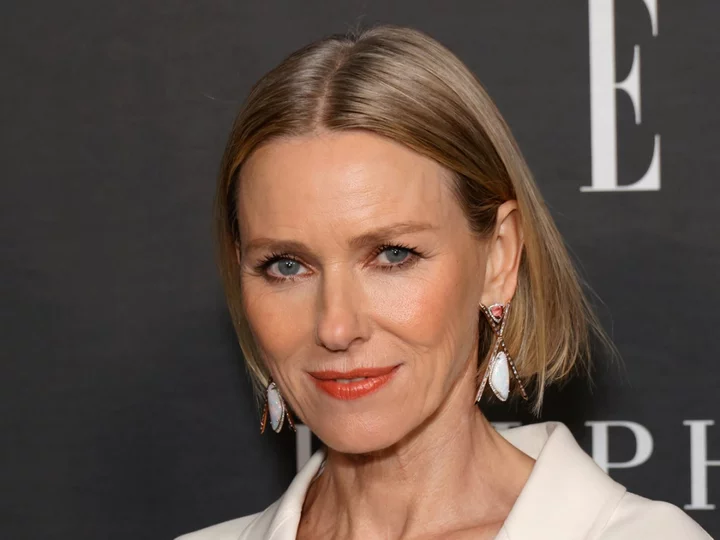
Naomi Watts admits mid-thirties menopause felt like ‘the end of my worth’
Naomi Watts has admitted that going through menopause in her mid-thirties felt like “the end of her worth”. Watts, now 55, said she thought of menopause as “equating to the end” of her career, when she experienced it three years after her breakthrough performance in David Lynch’s 2001 psychological thriller Mulholland Drive. In an interview with Times Radio on Thursday, the two-time Oscar-nominated actor added that the lack of conversation around menopause – or the end of menstruation – “told me that you don’t matter anymore”. She continued: “So I kind of spent a lot of time spinning out and turning in on myself, feeling panicked about the end of my career, the end of my worth. If I can’t bring children into the world, my partner will probably leave me. What do I mean? Where’s my purpose?” Watts has been advocating for greater awareness and sensitivity around the subject, with the actor launching her own menopausal beauty brand Stripes last October. In the interview, she noted that, while women come together to discuss their periods, first kisses, or experiences with getting pregnant, the conversation around menopause has remained shrouded in secrecy and shame. However, Watts acknowledged that she wouldn’t have spoken about her own experiences when she was younger. Opening up about her decision to talk about going through early menopause publicly, she said: “Maybe it was just the right timing, maybe that the average age of menopause is 51. Maybe I just had to get past that milestone to actually admit that that was me. However, Watts added, her outlook has since changed because she “got on top of the education” and has a better understanding of it. “I’ve also got my friends,” she continued, underscoring the importance of having a community. “We can moan about it if we have to, laugh about it and share our experiences openly. “I think when the conversation is off the table, that’s the worst part of it,” Watts said. The Impossible actor has previously said that going through early menopause was “incredibly isolating”, with the NHS estimating that premature menopause – before the age of 40 – affects one per cent of women in the UK. The symptoms are the same as perimenopause, or the years of transition leading up to menopause. These usually include changes in the pattern and/or frequency of menstrual cycles, anxiety, mood changes, hot flushes, and hair loss or thinning. Read More ‘It was the most isolating experience’: Meet the women with early menopause Smoking causes 150 cancer cases every single day in UK, study finds Millions of women able to get contraceptive pills over the counter next year Smoking causes 150 cancer cases every single day in UK, study finds Millions of women able to get contraceptive pills over the counter next year Woman with cystic fibrosis had weeks to live – now she’s climbing mountains
1970-01-01 08:00
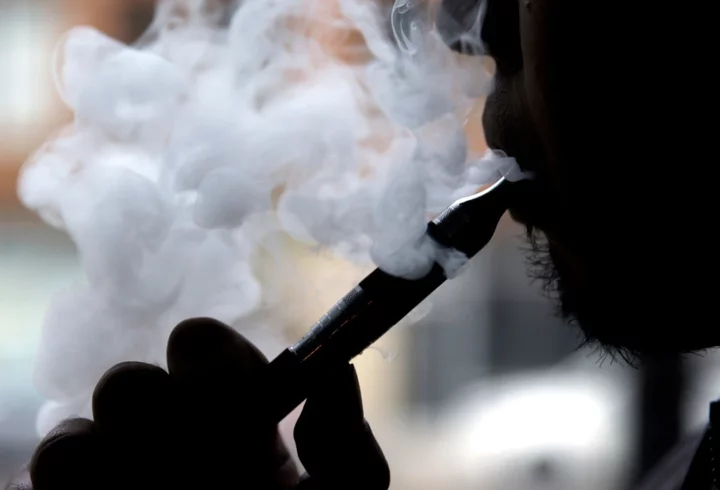
Smoking causes 150 cancer cases every single day in UK, study finds
Smoking causes 150 cancer cases every day in the UK alone, according to a new study. While tobacco smoking in the UK and US peaked to about 50 per cent in the 1950s, this had dropped to around 13 per cent in 2020-21 due to control efforts, said the study. However, historically high smoking rates are still a driving factor of the cancer burden in the countries today, it said. Very high-income countries like the UK are projected to see a 50 per cent increase in cancer cases over the next 50 years, said Cancer Research UK, that funded the study, on Wednesday. Researchers called on MPs to support raising the age of sale of tobacco products as a critical step to create the first ever smoke-free generation. “Action on tobacco would have the biggest impact – smoking causes 150 cases of cancer in the UK every single day,” said Ian Walker, executive director of policy and information at Cancer Research UK. “There are cost-effective tools at hand to prevent cases of cancer, which will save lives around the world. “Tobacco control measures are chronically underfunded. And as a recognised leader in global health, the UK government can play a significant role in addressing this,” Mr Walker said. The study also revealed at least 1.3 million people in seven countries die due to cancer caused by smoking tobacco. The deaths across the UK, US, Brazil, Russia, India, China and South Africa represent over half the world’s annual cancer death burden. The study analysed the years of life that were wasted to cancer. It also assessed whether certain risk factors caused deaths more prematurely. Researchers found four preventable risk factors resulted in almost two million deaths combined and over 30 million years of life lost each year. These factors are smoking, alcohol consumption, obesity and human papillomavirus (HPV) infections. At least 20.8 million years of life are lost from smoking tobacco alone, found the study. It also warned new cancer cases could surge by five times, from 0.6 million to 3.1 million per year in low-income countries over the next 50 years. “These numbers are staggering, and show that with action on a global scale, millions of lives could be saved from preventable cancers,” Mr Walker said. Researchers also found gender differences in the number of cancer deaths. Men were observed to have higher rates of years of life lost to smoking and drinking alcohol as these rates tend to be higher in men. In China, India and Russia, the rates of years of life lost to tobacco smoking and alcohol were up to nine times higher in men than women, found the study. The research was published in the journal eClinicalMedicine and involved the work of researchers from King’s College London and Queen Mary University of London. Read More Binman shoots first Hollywood film after chat with Mark Wahlberg changed his life UK’s tallest living Christmas tree lit up with 1,800 bulbs Morrisons Christmas ad features iconic 80s track and shares support for festive hosts The best foods to forage in November and how to cook them Millions of women able to get contraceptive pills over the counter next year Woman with cystic fibrosis had weeks to live – now she’s climbing mountains
1970-01-01 08:00
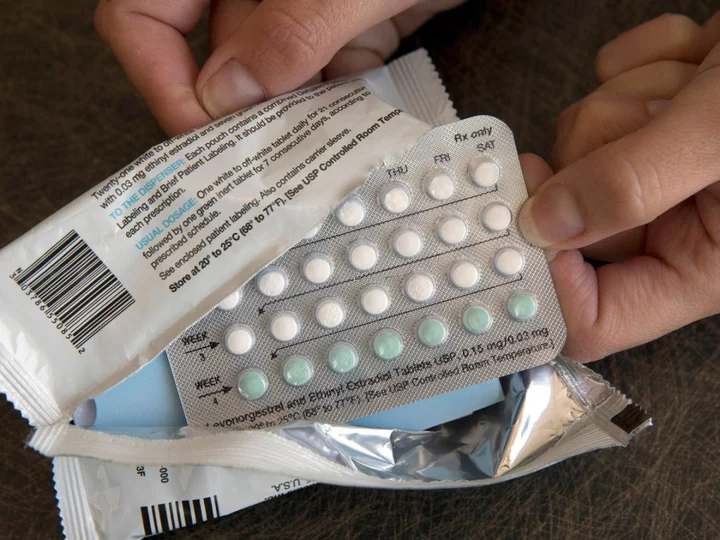
Millions of women able to get contraceptive pills over the counter next year
Millions of women will be able to get free contraceptive pills on the high street from next year without having to see a GP, under new plans revealed by the NHS. Starting next month, women in England can obtain a first prescription of the pill by visiting their local pharmacy. The change will give women greater choice over where to get the pill, and will free up 10 million appointments in GP surgeries, according to NHS England. The move has been hailed as a “step in the right direction” for patients and comes as part of a broader plan to allow patients to be treated for a range of conditions at local pharmacies. These conditions include sore throats and urinary tract infections. William Pett, the head of policy, public affairs and research at Healthwatch England, said: “Women across England will welcome the convenience of getting the contraceptive pill at a local pharmacy. “Being able to see your GP in a timely manner remains the public’s top concern. “If this initiative is effectively communicated and delivered, it will make a real difference to patients and relieve the pressure on hard-pressed services.” Mr Pett said there could be problems with the plan, though, such as pharmacists not being able to see a patient’s GP records, or differences in access between different areas of the country. The plan to make the pill available from pharmacies was piloted among a cohort of 4,500 women earlier this year. Under the scheme, if women opt for the combined oestrogen and progestogen pill, they will have a check-up with a pharmacist to record their blood pressure and weight. No checks are needed for the mini pill (progestogen only), which is also the case in other settings, NHS England said. Pharmacies need to sign up for the new service, meaning that it will not be available immediately everywhere in England. As more pharmacies join the scheme, the NHS web page will be updated so that women can check which locations offer the service. Women who are significantly overweight, or whose blood pressure is high – putting them at higher risk of blood clots on the combined pill – may be referred to their GP for further checks. The ongoing checks on blood pressure and weight that women need when they are on the pill will also be available in pharmacies. Funding has also been put in place to allow more pharmacies to offer repeat prescriptions of all types of contraceptive pill. NHS England said it expects almost half a million women to be able to access the pill next year without needing to contact their GP first, with the figure rising after that. Prescription figures for 2022-23 suggest there were almost 3 million prescriptions for the combined pill and more than 4 million for the mini pill. NHS chief executive Amanda Pritchard said of the plan: “This is really good news for women – we all lead increasingly busy lives, and thanks to this action, rather than making a GP appointment, they can simply pop into their local pharmacy when they need or want to access contraception. “We will also be expanding services so that more health checks are available for patients on the high street, which is not only better and easier for patients but also frees up NHS time for more GP appointments for those who need them most.” Under wider plans, pharmacists will be offering more blood pressure checks to patients who are at risk of high blood pressure, with a commitment to deliver 2.5 million a year by spring 2025. NHS England estimates that this could prevent more than 1,350 heart attacks and strokes in the first year. Dr Leyla Hannbeck, CEO of the Association of Independent Multiple Pharmacies, said: “This is a step in the right direction for patient care. The pharmacy network has the knowledge, skill sets and the willingness to deliver these services and support the NHS. For years we have been highlighting that, if supported appropriately, pharmacies can add a lot of value to the NHS. We are accessible and we have a track record of delivering for patients.” Victoria Atkins, the new health and social care secretary, said: “For the public, these changes will mean more options for women when making a choice about their preferred contraception, reduce the risks of people suffering heart attacks and strokes, and make it easier to access medicines for common conditions.” Janet Morrison, chief executive at Community Pharmacy England, said: “It makes perfect sense to use community pharmacies as a first port of call for healthcare advice, access to contraception, and health checks such as blood pressure tests.” Read More Stephen Fry uses walking stick after breaking his leg, pelvis and ‘a bunch of ribs’ Jonnie Irwin jokes he’s ‘whacked’ after attending The Streets gig in Newcastle Kourtney Kardashian ‘gives birth to first child’ with Travis Barker Stephen Fry uses walking stick after breaking his leg, pelvis and ‘a bunch of ribs’ Jonnie Irwin jokes he’s ‘whacked’ after attending The Streets gig in Newcastle Kourtney Kardashian ‘gives birth to first child’ with Travis Barker
1970-01-01 08:00
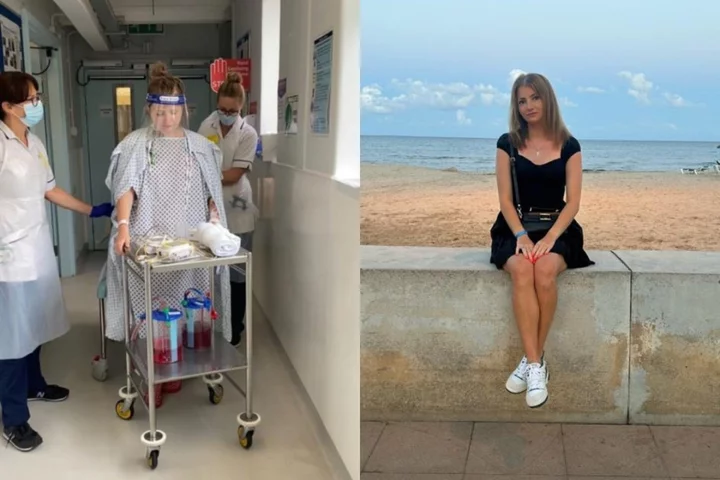
Woman with cystic fibrosis who had weeks to live before lungs transplant is now climbing mountains
A woman who felt she was being “suffocated” by her cystic fibrosis – and was told she had been just two weeks away from dying – has climbed Snowdon and run a half marathon after receiving two lungs from a transplant donor. Georgie Cooper, 26, was diagnosed with cystic fibrosis (CF) – a genetic condition which causes sticky mucus to build up in the lungs and digestive system – when she was two. The complaints and compliance officer, who lives in Essex, took medication and used nebulisers – machines which allow you to breathe in medicine – every day. She managed to maintain a “steady” lung function between 70 and 80 per cent until her health started deteriorating in her late teenage years. Cooper said 2018 was “the worst year” because she could not breathe properly and spent four months in and out of hospital as her lung function had dropped to 30 per cent and then to just 9 per cent. She was prescribed Orkambi, followed by Symkevi, to manage the condition. She was told she needed oxygen therapy 24 hours a day, which meant she had “tubes hanging out (her) nose”, and had to use a wheelchair. “It felt like constant suffocation, like I was being suffocated every minute, every second of every day.” Just two weeks before Christmas 2018, when she was 20, Cooper was told she had “a maximum of two years to live” and should consider a double lung transplant. While she waited for a donor, Cooper was prescribed Kaftrio to treat her CF, which she believes kept her alive. Her mother, Lesley, who she described as her “rock”, became her full-time carer and, after three false alarms, Cooper finally received the call that “we’ve got a set of lungs for you”. The surgery in June 2021, at Harefield Hospital in London, was successful – and came just in time. Cooper was told after the operation that her lungs had looked like “pulled pork” due to the CF damage, and she would have only lived for around two more weeks without the transplant. Before her surgery, Cooper had experienced three false alarms about suitable donors, and had started to believe that “to die would be peace”. During this time, she planned her funeral and created a “dream” bucket list – including going abroad again – to look forward to should she survive. She said she tried to stay positive as she knew she only had “a short time left on this Earth”, but found it extremely difficult knowing she was dying. “I had actually written my goodbye letters to my mum, dad, brother, my nan and pa, in case it didn’t work out, or in case I died before my transplant,” she said. She is incredibly grateful that the fourth call from the transplant service was a success. She describes her donor, who cannot be identified, as her “hero”. In August 2022, and after recovering, Cooper climbed Snowdon – now also known as Yr Wyddf and the highest mountain in Wales. She also completed the Bath Half Marathon in October 2023. “Snowdon, at that point, was my greatest achievement,” she said. “I felt like that’s the closest I’m going to get to my donor for now, which was really emotional. Someone else has selflessly given something of theirs to save another life – it’s incredible. She is the greatest hero that I never knew.” Cooper was born with no health complications, but soon developed a persistent cough, which raised alarm bells for her parents. After being referred to the Royal Brompton Hospital when she was two years old, she received her CF diagnosis and started taking medication and using nebulisers and having physiotherapy. While this was “normal” for Cooper, during secondary school she said she was “outed” as having CF during science lessons and her classmates and teachers discussed symptoms and life expectancy. According to the charity Cystic Fibrosis Trust, the median age of death of someone with CF in 2022 was 33. While Cooper was aware of the statistics, she said her peers at school would regularly say: “Oh you’re going to die soon, you haven’t got long left, have you?” Cooper says she cannot believe what she has overcome and achieved since the surgery, having also secured her first job as well as her running and mountain-climbing exploits. She now plans to climb Ben Nevis in Scotland – the highest mountain in the UK. While she still has to take immunosuppressants and struggles with survivor’s guilt, Georgie says she feels she has been “reborn” and now “lives for two people every day”. She was told her donor’s favourite quote was “your mountain is waiting”, which inspired her Snowdon adventure, and she wants to encourage others to “live every day like it’s your last”. She said: “Life is full of tablets, but I’m not having any physio, no nebulisers, and it’s like being reborn – it’s a life I’ve not known and I’m making up for lost time. I owe my life to my donor. She is my hero, she’s the greatest hero I never knew. It’s a gift of life, and that’s the best gift I’ll ever be given.” For more information and support, visit Cystic Fibrosis Trust’s website at: cysticfibrosis.org.uk. For more lung transplant information, visit: cysticfibrosis.org.uk/what-is-cystic-fibrosis/cystic-fibrosis-care/transplant-information-and-resources.
1970-01-01 08:00

Marlon Wayans reveals his child is transgender as he expresses ‘unconditional love’ for son
Marlon Wayans has revealed that his son is transgender. Now, the actor and producer is opening up about his own “transition” as the parent of a trans child. In an interview on The Breakfast Club on 10 November, the White Chicks star shared that his eldest child changed their name and pronouns. “I have a daughter that transitioned into a son,” the comedian said, adding that his child now goes by the name Kai. At first, Wayans admitted that his son’s transition was difficult for him to accept. However, he plans to focus on both Kai and the lessons he’s learned as a parent in an upcoming comedy special, tentatively titled Rainbow Child. “I talk about the transition, not their transition, but my transition as a parent going from ignorance and denial to complete unconditional love and acceptance,” Wayans said. “And I think there’s a lot of parents out there that need to have that message, and I know I’m dealing with it. It was a very painful situation for me.” The 51-year-old actor went on to praise Kai as “brilliant” but admitted that he’s “still working” on addressing his son by his correct pronouns. “They know I love them, they see me trying. They’re like: ‘I’m happy,’” Wayans said. “But I gotta respect their wishes.” He explained that his greatest wish for both of his children - including his 21-year-old son, Shawn - was to “be free” and confident in who they are. “I want them to be free in spirit, free in thought, free to be themselves,” Wayans said. “The more you know yourself, the more you can govern yourself. The more you live your truth, the happier your existence.” “I’m just so proud of them for being them,” he added. Wayans shares sons Kai and Shawn with his former partner, Angela Zackery. While the two were in a long-term relationship from 1992 to 2013, they were never married. The Air star has often shared glimpses into his life as a father of two on social media. Back in September 2022, Wayans celebrated National Son Day by posting throwback yearbook photos of both Kai and Shawn. “Happy #nationalsonday Shawn and Kai,” he captioned the amusing post. “I can’t believe y’all actually smiled like this for class pictures…The f***?! I told you it would come back to haunt y’all a**es.” In May, Wayans shared a birthday tribute for Kai by posting a sweet photo of him kissing Kai on the cheek after his graduation. In the caption, the comedian shared a special message to his transgender son, thanking him for “teaching me what [it] really means” to love unconditionally. “Happiest bday my baby… daddy loves you to the moon and back,” Wayans wrote. “I’ve always asked people to love me unconditionally, thank you for teaching me what that really means. Be you! Your best you! You’re the gift and I’m wrapping paper… love love love you for life. “Excuse my ignorance, chalk it up to growth. Love you so much, thank you for making me a man. So proud,” he added, alongside a rainbow emoji. Read More People crave comfort food more during the winter season - here’s why Gordon Ramsay’s daughters praise ‘rockstar’ mom after giving birth to sixth child Top 10 hacks to beat the afternoon slump People crave comfort food more during the winter season - here’s why Gordon Ramsay’s daughters praise ‘rockstar’ mom after giving birth to sixth child Top 10 hacks to beat the afternoon slump
1970-01-01 08:00
